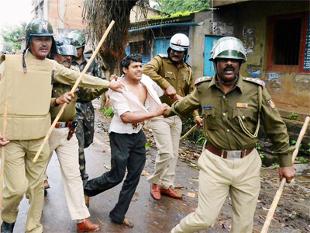Mumbai, Jul 28: The police action against Marathi-speaking people at Yellur in Karnataka has prompted protests by political parties in Maharashtra, with the Shiv Sena calling it as an act of "terror" and seeking Centre's intervention in the "disputed" region.
"It is the reign of goondas. Even we can do this goondagiri but we won't do that. We demand that the Centre immediately declare the border area in Karnataka where 20 lakh Marathi-speaking people live, as Centrally administered region and appoint a Central representative as administrator," Sena spokesman Sanjay Raut told reporters.
"Brutal atrocities are going on in Belgaum against Marathi-speaking people merely over removal of a board. Is this the rule of law?"
Raut, a Rajya Sabha MP, said after a meeting of the Shiv Sena-BJP-led 'Mahayuti' (grand alliance) passed a resolution condemning the "assault" by Karnataka police.
Earlier, an editorial in Sena mouthpiece 'Saamana' described yesterday's police action at Yellur in Belgaum district as and act of "terrorism" and sought the Centre's intervention.
"In Modi, we have a strong Prime Minister and in Rajnath Singh, we have got a strong Home Minister. The Marathi speaking populace in the border area has great expectation from them.
"If Karnataka police are indulging in terror against Marathi-speaking people, it is the responsibility of the Central government to curb this terrorism. We are making this appeal to the Central government because those ruling Maharashtra are incompetent," the editorial said.
Police had yesterday lathicharged a group of pro-Maharashtra supporters who threw stones at them at Yellur after a 'Maharashtra Rajya' plaque re-erected by them was removed by the district administration.
Pro-Maharashtra supporters had on Saturday re-erected a controversial signboard at Yellur after the previous one was razed to the ground by Public Works Department on Friday following a High Court order.
In a bid to calm frayed tempers in Lok Sabha, Union Minister M Venkaiah Naidu dismissed the allegations against the Sena MPs as "unsubstantiated" and said they need to be verified first lest they raise communal passions.
"We are dealing with a sensitive issue... Don't try to raise communal passions. Nobody knows the truth. Whether the incident has happened or not, we are not sure," Naidu said.
He said the the government is in no way connected with the "unsavoury" incident. "We need to enquire...Let us not send wrong signals to the country."
Raising the issue during Zero Hour, Congress member M I Shanavas described the incident as "shocking" and said it is "cutting at the root of secularism. MPs who should be role models have become bad models...The faith of minorities has been tarnished. The House should condemn it."
Defending the Sena MPs, party leader and Union Minister Anant Geete said, "Those who want to respect the month of Ramzan should not make false statement in the House", triggering sharp protests from the Opposition.
"Whatever the report has appeared is totally false and Congress is trying to tarnish the image of the Narendra Modi government," Geete said.
In the Rajya Sabha, Minister of State for Parliamentary Affairs Prakash Javadekar said, "It is an unsubstantiated report. We should not take it to the next level. Let it be ascertained. There are sensitivities involved."
Outside Parliament, Krupal Tumane, Shiv Sena MP, said the food in the New Maharashtra Sadan is of inferior quality and the rotis cannot be broken with hand.
"We waited for the Resident Commissioner for over an hour to register our complaint.
Since he did not turn up, we went to the canteen and asked the employee to eat the rotis himself. A Roza is not broken till the time someone swallows the food."
He accused the Congress of trying to give a communal colour to the incident.
The BJP came out in defence of its ally and said that the MPs had no inclination to hurt religious feelings of any individual.
"The video also shows that the MPs had no intent to hurt anyone's feelings," BJP spokesperson Rajiv Pratap Rudy said.
When asked whether this case was fit to be referred to Parliament's Ethics Committee, NCP MP Supriya Sule responded in the affirmative.
Ghulam Nabi Azad, Leader of the Opposition in Rajya Sabha, said, "I appeal that no communal colour should be given to this. But, they should not have tried to thrust rotis during the month of Ramzan when the person was observing fast."
MIM Chief and Hyderabad MP Asaduddin Owaisi demanded that a compalint be filed against the erring MPs and also their arrest.





Comments
Add new comment